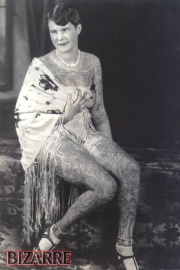Tattooed ladies: Difference between revisions
(Created page with "<html><div class="mw-content-ltr" dir="ltr" id="mw-content-text" lang="en"><div class="thumb tright"><div class="thumbinner" style="width:182px;"><a class="image" href="/index.php?title=File:Bettybroadbentbizarre_magazine_29398_12.jpg"><img alt="" class="thumbimage" height="270" src="/images/thumb/8/84/Bettybroadbentbizarre_magazine_29398_12.jpg/180px-Bettybroadbentbizarre_magazine_29398_12.jpg" width="180"/></a> <div class="thumbcaption"><div class="magnify"><a class="i...") |
(No difference)
|
Revision as of 01:34, 21 May 2023
The Tattooed Lady was a popular act back in the halcyon days of the sideshow, with the lady in question often taking the stage name Pictura. Tattooed ladies began exhibiting themselves during the 1880s. They would get on stage, talk about their lives (usually made up stories) and show off their bodies. Tattooed men performers, such as Captain Constentenus, were a major influence on tattooed ladies as they began performing eighty years before women started. Tattooed men told stories of being captured and forced into being tattooed. The tattoo ladies told similar stories, saying they were captured by "savages" and tattooed against their will. Tattooed ladies brought a sexual allure to their show, something the men couldn't achieve and became more popular than the tattooed men. Tattooed ladies were paid much more than other circus workers and even working class men.[1]
Many people disapproved of tattooed ladies because of the revealing clothing they wore.
Some of the more famous tattooed ladies include: Betty Broadbent, Artoria Gibbons, Irene Woodward and Nora Hildebrandt. Groucho Marx's signature tune was "Lydia the Tattooed Lady".
